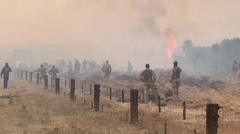The UK government has taken a vital step toward justice for Kenyans affected by a fire caused by British military exercises nearly four years ago. An agreement has been reached to compensate 7,723 claimants, who reported losses and health issues resulting from the fire in the Lolldaiga conservancy, located in the Rift Valley.
The British High Commission in Nairobi expressed that the fire was "extremely regrettable" and emphasized the time and resources dedicated to resolving these claims. Although the exact compensation amount has not been confirmed by the government, legal representatives indicate that the payout is approximately £2.9 million.
Lawyer Kevin Kubai, representing the claimants, described the settlement as the "best possible outcome," despite expressing concerns that the compensation amount was inadequate for the clients' losses. He noted that continuing legal battles could have taken up to seven more years, complicated by the loss of evidence over time.
The 2021 incident was attributed to a camp stove that was knocked over during military exercises, resulting in damage to nearly 7,000 acres of private land. Although the local communities were not directly affected, the lawsuit highlighted environmental impacts due to smoke and property destruction caused by wild animals stampeding due to the fire.
The UK Ministry of Defence reported that restoration efforts for the burnt area have been put in place, and military training exercises continue in the conservancy. The Lolldaiga conservancy, spanning approximately 49,000 acres of scenic bushland, has historical significance dating back to the colonial era when land disputes originated from British land seizures.
The British Army Training Unit Kenya (BATUK) operates in the region, contributing significantly to the local economy, despite controversies surrounding the conduct of some soldiers. Allegations of misconduct, including violent incidents and sexual exploitation, have previously garnered attention, underscoring the complexities of military presence in the area.
As the UK and Kenyan governments navigate these historical and contemporary challenges, the recent compensation agreement marks a notable step in addressing the grievances of those affected by the fire.
The British High Commission in Nairobi expressed that the fire was "extremely regrettable" and emphasized the time and resources dedicated to resolving these claims. Although the exact compensation amount has not been confirmed by the government, legal representatives indicate that the payout is approximately £2.9 million.
Lawyer Kevin Kubai, representing the claimants, described the settlement as the "best possible outcome," despite expressing concerns that the compensation amount was inadequate for the clients' losses. He noted that continuing legal battles could have taken up to seven more years, complicated by the loss of evidence over time.
The 2021 incident was attributed to a camp stove that was knocked over during military exercises, resulting in damage to nearly 7,000 acres of private land. Although the local communities were not directly affected, the lawsuit highlighted environmental impacts due to smoke and property destruction caused by wild animals stampeding due to the fire.
The UK Ministry of Defence reported that restoration efforts for the burnt area have been put in place, and military training exercises continue in the conservancy. The Lolldaiga conservancy, spanning approximately 49,000 acres of scenic bushland, has historical significance dating back to the colonial era when land disputes originated from British land seizures.
The British Army Training Unit Kenya (BATUK) operates in the region, contributing significantly to the local economy, despite controversies surrounding the conduct of some soldiers. Allegations of misconduct, including violent incidents and sexual exploitation, have previously garnered attention, underscoring the complexities of military presence in the area.
As the UK and Kenyan governments navigate these historical and contemporary challenges, the recent compensation agreement marks a notable step in addressing the grievances of those affected by the fire.

















